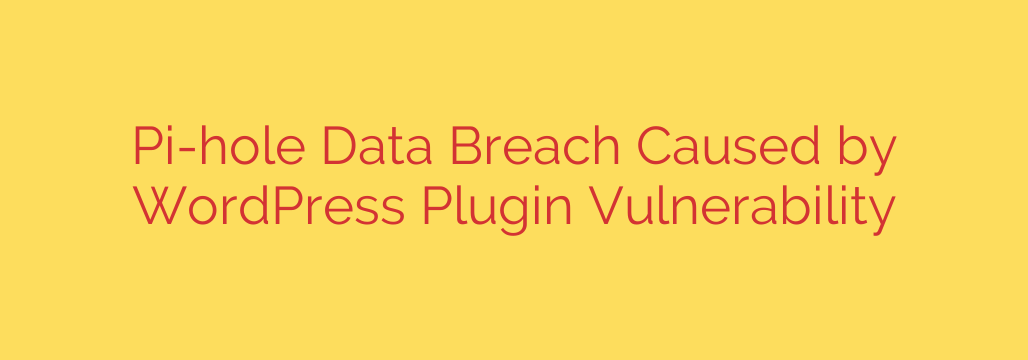
Understanding the Pi-hole Data Breach: A Critical Lesson in Website Security
A recent security incident involving the popular network-wide ad-blocker, Pi-hole, has served as a stark reminder of how vulnerabilities in common website tools can lead to significant data breaches. While the core Pi-hole software itself remains secure, the project’s official website, which runs on WordPress, was compromised, leading to the exposure of user data from its help desk and support forum.
This breach highlights a critical distinction for users and administrators alike: the security of an application is separate from the security of the web infrastructure that supports it.
What Happened? The Root Cause of the Breach
The investigation into the security event revealed a clear culprit. The breach was traced directly to a vulnerability in a third-party WordPress plugin used on the Pi-hole website. Attackers exploited a flaw in this plugin to gain unauthorized access to the site’s underlying database.
This access allowed the malicious actors to exfiltrate sensitive information belonging to users of the Pi-hole support forum. The compromised data reportedly includes:
- Usernames
- Email addresses
- Hashed passwords
- IP addresses associated with user posts
It is crucial to understand that the core Pi-hole ad-blocking software installed on users’ networks was not affected by this incident. The vulnerability was confined entirely to the project’s public-facing WordPress website.
The Pervasive Risk of Third-Party Plugins
This incident is not an isolated case; it underscores a widespread security challenge. WordPress powers over 40% of the web, and its flexibility comes from a vast ecosystem of third-party plugins. While these plugins add powerful features, every installed plugin introduces new code and a potential new attack vector.
Vulnerabilities can arise from outdated code, poor development practices, or a lack of ongoing maintenance from the plugin developer. For website administrators, this means that even if the WordPress core is fully updated, a single vulnerable plugin can compromise the entire site.
Actionable Security Steps for Users and Administrators
In response to the breach, the Pi-hole team acted swiftly to contain the threat by disabling the faulty plugin and securing the website. However, this event provides valuable lessons for anyone who uses online forums or manages a website.
For users of the Pi-hole forum (or any breached service):
- Change Your Password Immediately: If you have an account on the Pi-hole website, change your password without delay.
- Audit Your Password Reuse: If you used the same password on other websites, change it there as well. Credential stuffing, where attackers use stolen passwords to try and access other accounts, is a common follow-up attack.
- Enable Two-Factor Authentication (2FA): Wherever possible, enable 2FA on your important accounts. This provides a critical layer of security that protects you even if your password is stolen.
For all WordPress website administrators:
- Conduct a Plugin Audit: Regularly review every plugin installed on your site. Ask yourself: Is this plugin still necessary? Is the developer reputable and actively maintaining it? Remove any plugins that are not essential.
- Prioritize Updates: The single most important security measure is to keep your WordPress core, themes, and plugins updated. Enable automatic updates for plugins where possible.
- Use a Web Application Firewall (WAF): A WAF can help block malicious traffic and known attack patterns before they ever reach your website, acting as a frontline defense against exploits.
- Enforce Strong Password Policies: Require strong, unique passwords for all user accounts, especially for administrators.
- Limit User Privileges: Ensure users only have the permissions they absolutely need to perform their roles.
Ultimately, the Pi-hole data breach is a powerful case study in modern cybersecurity. It demonstrates that vigilance is key and that security is a multi-layered responsibility, extending from the core application to every third-party component that supports it.
Source: https://www.bleepingcomputer.com/news/security/pi-hole-discloses-data-breach-via-givewp-wordpress-plugin-flaw/








